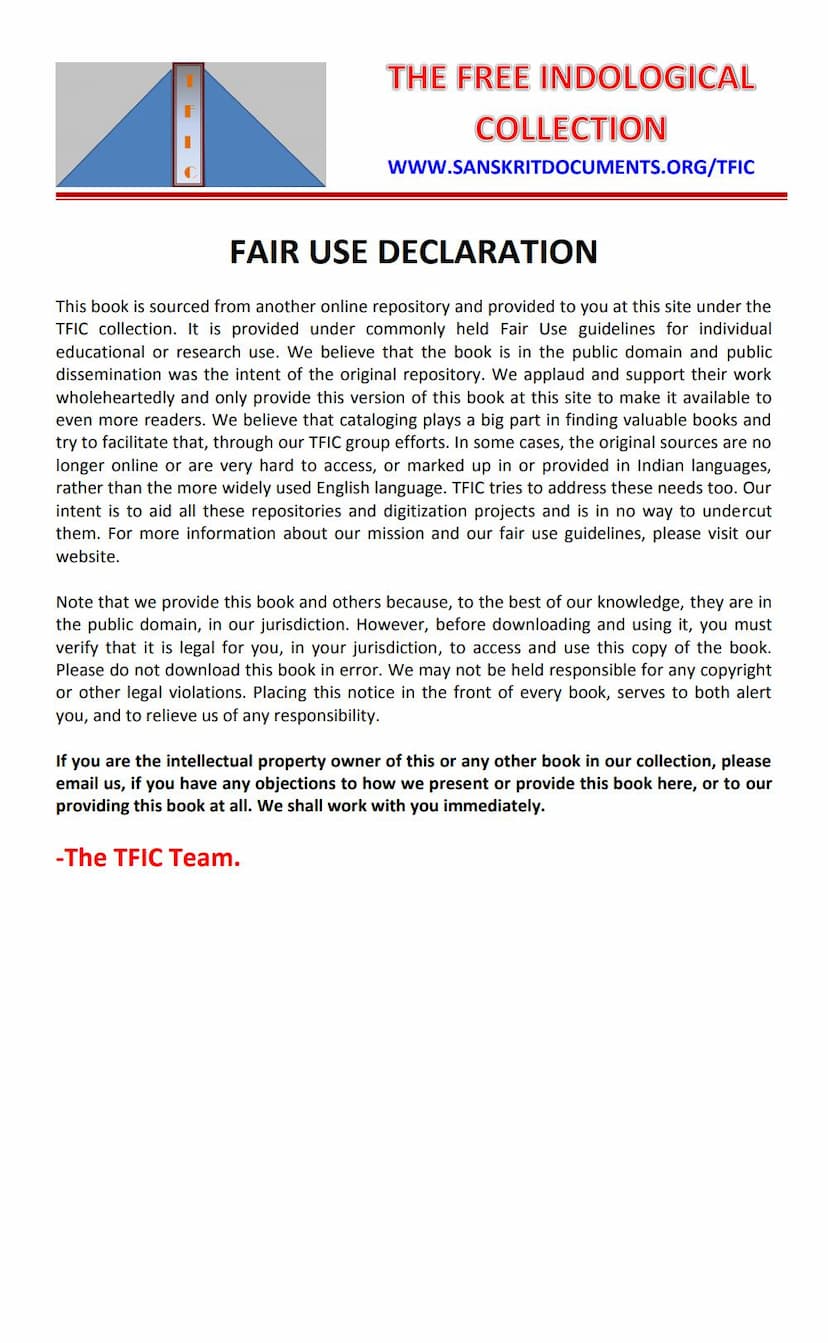Divinity In Jainism
Added to library: September 1, 2025

Summary
Here is a comprehensive summary of "Divinity in Jainism" by Harisatya Bhattacharyya, based on the provided text:
This book, "Divinity in Jainism," by Harisatya Bhattacharyya, published in 1925, aims to present the Jaina perspective on God from the viewpoint of a dispassionate student of comparative theology. The author's intention is not to criticize other religious doctrines but to explain the Jaina concept of divinity and highlight its similarities and differences with other theological views.
The book begins by defining "Divinity" as it's commonly understood, referring to a Creator of the universe. It discusses the Theistic view, prevalent in religions like Hinduism, Christianity, Islam, and Judaism, which posits a creator God. This is illustrated with arguments, such as the watchmaker analogy, pointing to the order and design in the universe as evidence of an intelligent maker. The author mentions that similar arguments were used in ancient India by the Nyaya and Vaisheshika schools, who believed in a God who created the world out of kindness.
However, the book then delves into the criticisms of Theism. Western anti-theists and Jaina philosophers raised objections. These included the argument that the observed order in the universe is due to material laws, not divine intervention. They also pointed to the suffering and imperfections in the world as evidence against a kind and intelligent creator. Jainas, in particular, questioned the Nyaya idea that the universe is a "product" and argued that if God is a creator, He must be embodied and therefore finite, contradicting the concept of an infinite God. They also criticized the idea of divine kindness in a world filled with suffering.
The text then explores Pantheism, where the universe is seen as a manifestation or modification of God. This view, originating in ancient Greek thought and prominent in modern Europe through philosophers like Spinoza and Hegel, posits that "there is nothing but God." India's Advaita philosophy, with its concept of Brahman as the sole reality and the universe as an illusion, is presented as a similar doctrine. However, the author highlights criticisms of Pantheism, arguing that it denies the reality of the world and, by extension, the possibility of individual freedom and responsibility, crucial for liberation. Jaina philosophers are presented as criticizing Advaita for making concepts like bondage and salvation meaningless if all souls are ultimately identical with Brahman.
The book then moves to the Ontological Argument, primarily from European philosophy (St. Augustine, Anselm, Descartes, Royce), which argues for God's existence based on the idea of a Perfect Being. The author notes that India also had similar theories, citing Patanjali's Yoga philosophy, which describes God as untouched by pain, action, or volition, and as the source of all omniscience. However, the critique of this argument, famously by Kant, is also presented: having an idea of a perfect being doesn't prove its real existence. This criticism is echoed by a commentator on Yoga philosophy, suggesting that specific attributes of God are known through scriptures.
The Jaina response to these criticisms and their own conception of divinity is then detailed. The Jaina philosophy does not accept a single, ever-existing, omniscient God in the way theistic traditions do. Instead, the Jaina concept of divinity is rooted in the Soul (Jiva).
Key Jaina doctrines regarding divinity are:
- Omniscience is Natural to the Soul: The Soul's inherent nature is to be omniscient. Its current limited knowledge is due to the presence of Karmas, particularly the "knowledge-obscuring" Karmas.
- Emancipated Souls are Omniscient: Those Souls who have successfully removed the obstacles of Karma, specifically the Ghātiya Karmas (knowledge-obscuring, perception-obscuring, deluding, and obstructive), attain a state of pure knowledge called Kevalagnana. These emancipated souls are considered Omniscient Beings.
- God is an Omniscient Being: The Jaina "God" (Isvara) is not a creator but rather an Omniscient Being, which is synonymous with an emancipated Soul.
- Polytheism of Divinity: Since numerous Souls have achieved emancipation throughout time, Jainism posits not one God, but multiple Omniscient Beings. When viewed through their shared attributes like omniscience, this can be seen as a form of monotheism, but fundamentally, it's a belief in many divine souls.
- The Tirthankaras: These are exceptional emancipated souls who appear in every cosmic cycle to teach the path to liberation. They are the guides and the exemplars for humanity, worshipped as divine. The book provides detailed descriptions of their perfect qualities, divine birth, and the auspicious events surrounding them.
- The Arhat: This is a state achieved after destroying the Ghātiya Karmas. An Arhat possesses the four infinities: perception, knowledge, happiness, and power. They are embodied but free from worldly attachments.
- The Siddhas: These are souls who have not only destroyed the Ghātiya Karmas but also the Aghātiya Karmas (age, name, lineage, feeling), thus achieving complete liberation from the physical body (Videha Moksha). They reside in the Siddha Shila at the summit of the universe. The Siddhas are the ultimate perfected beings, possessing infinite knowledge, perception, power, and happiness, remaining eternally in a state of equanimity and bliss.
The book also addresses and refutes the Mimānsā school's denial of Omniscience, arguing that the potential for omniscience is inherent in the Soul and can be realized by removing karmic obstructions. The Jaina view on scripture (Agama) is that it is authoritative because it is the word of an Omniscient Being, and the existence of Omniscient Beings is confirmed by scripture, forming a valid interrelationship.
In conclusion, "Divinity in Jainism" asserts that Jainism's concept of God is fundamentally different from the creator God of other religions. It posits that divinity is realized through the Soul's own efforts towards liberation from karma, leading to omniscience and perfection. The Jaina path is one of self-culture and self-improvement, with the Tirthankaras and Siddhas serving as luminous ideals for spiritual development. The author emphasizes the philosophical depth and sincerity of the Jaina pursuit of truth, noting its unique position within the landscape of Indian philosophical thought.